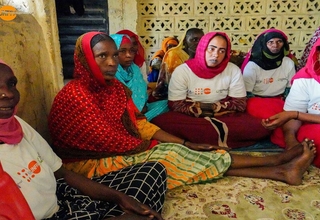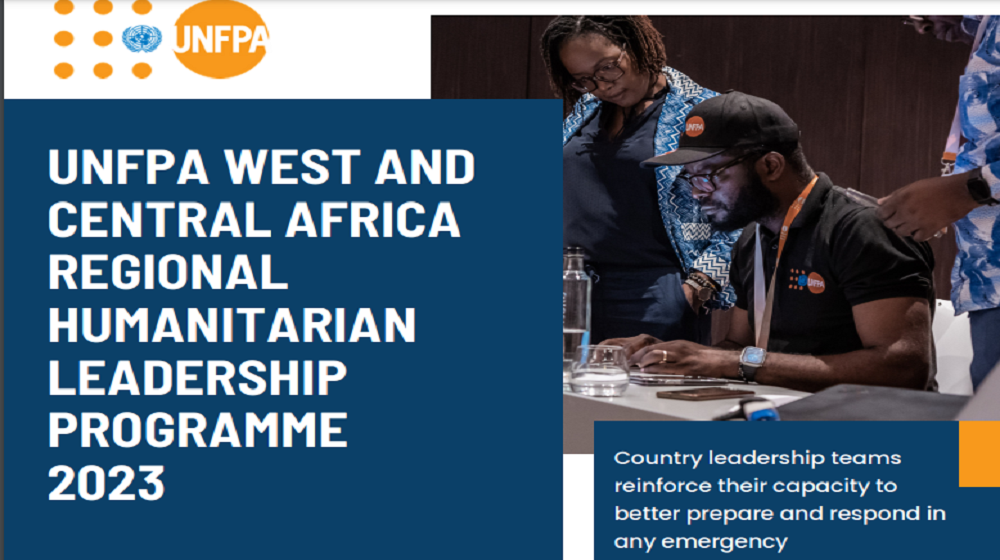FREETOWN, Sierra Leone. “I owe gratitude to UNFPA. Had it not been for the efforts of their contact tracers, I keep wondering whether I would have been alive today.”
These are the words of the Secretary of the Ebola Survivor’s Association in Bombali District, northern Sierra Leone, after she contracted the Ebola Virus Disease (EVD) and survived, through support from UNFPA-trained and supported contact tracers who also assisted her to resettle in her community, despite all odds.
Hajaratu F. Bangura, 28, a B. Ed graduate from the Northern Polytechnic, was reflecting on her life after being exposed to the disease and how the contact-tracers assisted her and several other survivors to know their status, access treatment, recover and overcome the stigma and discrimination that they were subjected to thereafter from certain relatives as well as friends and other members of their communities.
She said even when her entire household at Camel Street, Makeni was quarantined, including her two children and relatives the contact-tracers continued to pay regular contact-monitoring visits.
‘They kept checking on us from the Pity Garden Hospital, through Panlap Holding Centre to the Arab Hospital Holding Centre, where my son and I were tested, unto the Ebola Treatment Centre at the Magbenteh Hospital where I was admitted after the result proved positive; until I recovered three weeks later and returned home’.
Overcoming discrimination
She said, she initially thought that once anyone survives the virus, that was the end of it; but she was further traumatized as life became almost unbearable for her, because people started pointing fingers at and discriminating against her.
‘Everyone was avoiding me because no one wanted to have anything to do with me in fear of contracting the disease from me’.
‘God will surely bless these contact-tracers, because no one can pay them exactly for the kind of risky work they did and sacrifices they made during the outbreak’.
Hajaratu, with a Bachelor in Education degree in Agriculture from the Northern Polytechnic, currently provides voluntary health care services at the Old main referral Government Hospital in Makeni, as a means of paying back to the community for the humanitarian support she received. She is among hundreds of survivors who were identified and supported to access treatment by these contact-tracers that were deployed throughout the country during the period of the EVD outbreak.
UNFPA supported the Ministry of Health and Sanitation (MoHS) through leadership of the operations component of surveillance and contact tracing throughout the Ebola outbreak, with financial support provided by the World Bank and African Development Bank.
The Fund, in league with the Ministry of Health and Sanitation and the World Health Organisation (WHO), trained and deployed over 5,000 contract tracers and supervisors who followed over 100,000 contacts on continuous basis. These tracers were equipped with the necessary tools including mobile phones with Closed User Group Facility, protective gears and paid regular monthly incentives.
On November 24, 2015, about 17 days after Sierra Leone marked the end of the outbreak, UNFPA formally handed over EVD Contact Tracing to the Ministry of Health/WHO at a colorful ceremony held at its Conference Hall. These included a total of 1,417 Ebola Response Workers and related resources, comprising 1,183 Enhanced Contract Tracers and 234 Supervisors.
All Ebola Contact Tracers and Monitors, trained and deployed by UNFPA/MoHS, were recognized at the ceremony, including the 14 District Contact Tracing Monitors jointly awarded certificates by MoHS and UNFPA for their role in the fight against the disease.
UNFPA Representative used the occasion to donate vehicles worth US $91,935 to the Directorate of Disease Prevention and Control of the MoHS, to support disease surveillance and control.
UNFPA highly praised by President Koroma
It was therefore all smiles at the UNFPA mid December 2015, as UNFPA received kudos from the President of the Republic Sierra Leone, H.E. Ernest Bai Koroma, hailing the role of the Country Office in the national response during the unprecedented outbreak, characterized as the worst in the history of the disease.
In the letter of appreciation, dated November 27, 2015, the President specifically highlighted UNFPA’s work in EVD Surveillance and Contact Tracing, which he noted was central to the response.
'It was a long and challenging battle; but because you stood in solidarity with the people of Sierra Leone, we prevailed', the President acknowledged.
‘The Ebola Virus Disease was unknown to our country; our health system and personnel were unprepared for it. Its ferocity and magnitude astounded the world. But your support in surveillance and contact tracing in those hard-to-reach communities gave us the courage to fight on. You were central in breaking the chain of transmission and in shaping the response', the President noted.
He added that Government will remain committed to working closely with UNFPA in building a resilient health system and in meeting the goals set in the Ebola Recovery Programme.
‘We are extremely delighted and feel honoured and fulfilled that we have not only been able to overcome the disease, but that our efforts are continuously being recognized and appreciated by Government and the international community. We stand ready and remain committed to working in partnership with the Government and people of Sierra Leone in building a resilient post-Ebola health system’, the UNFPA Representative, Dr Bannet Ndyanabangi said.
He dedicated the letter to the honour of all Ebola Response Workers including five midwives and other health workers who had lost their lives in the line of duty.



